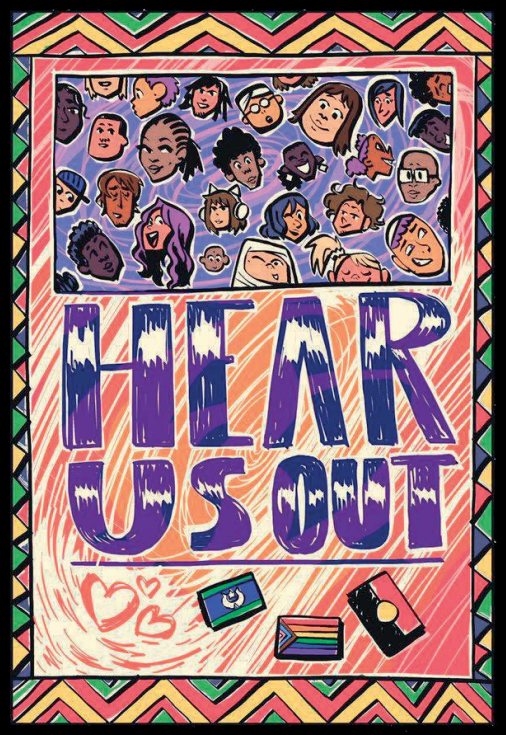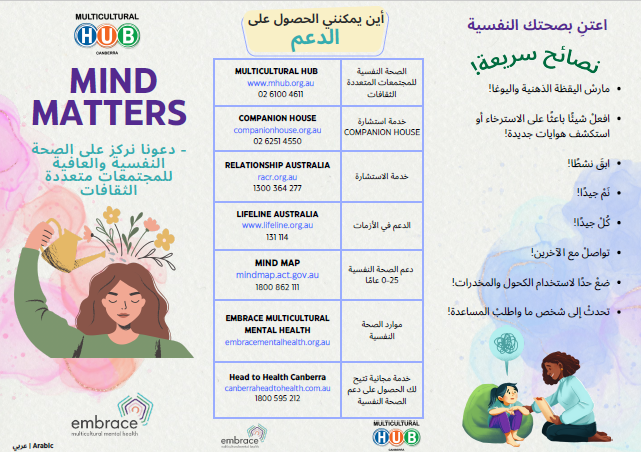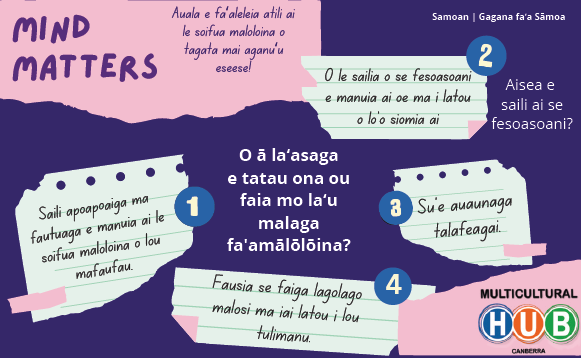The Embrace Project launched the CALD Community Engagement Project (CCEP) in 2021. The CCEP strives to increase engagement and close partnerships with CALD communities and support for mental health.
The CCEP is collaborating with selected CALD communities to identify mental health issues and needs, and co-design culturally responsive solutions and resources.
Over four years, twelve CALD communities will be engaged through commissioned community-based organisations using various tailored mechanisms and engagement strategies. Resources designed by and for these communities in response to identified mental health needs will be available here when complete per the expected schedule below.
An independent evaluation of the CCEP commenced in early FY23/24 and will run concurrently, concluding in mid-2025. The Centre for Evidence and Implementation (CEI) is undertaking the evaluation of the CCEP. The learnings from each community and partner organisation will further inform existing best practice and build sector capacity to increase community-based mental health supports.
The Embrace CCEP commissions community-based organisations to partner with and support community-led engagement and co-design with selected CALD communities. Community-based organisations build on their existing ties and trust within the communities to advance mental health literacy and community-based supports in ways that will endure beyond the project end date.
Round 1
- Rohingya community in Melbourne, VIC, in partnership with Southern Migrant and Refugee Centre
- Chinese/Mandarin community in NSW, in partnership with Chinese Australian Services Society (CASS)
- CALD youth in Darwin, NT, in partnership with Melaleuca Australia
See below section to find the resources developed by and for these communities!
Round 2
- Pasifika and Māori community in QLD, in partnership with Brisbane South PHN Ltd
- African women in Western Australia (WA), in partnership with Ishar Multicultural Women’s Health Services
- Afghan community in Adelaide, SA, in partnership with Survivors of Torture and Trauma Assistance and Rehabilitation Service (STTARS)
See below section to find the resources developed by and for these communities!
Round 3
- Tamil community, Sydney NSW, in partnership with Anglicare Sydney
- The Ezidi community, Armidale NSW, in partnership with NSW Service for the Treatment and Rehabilitation of Torture and Trauma Survivors (STARTTS)
- CALD communities, ACT, in partnership with Multicultural Hub Canberra
Co-designed resources expected by November - December 2024.
Round 4
- African Congolose community, Albury-Wodonga, in partnership with Albury-Wodonga Ethnic Communities Council
- Women belonging to Ethiopian/Eritrean, Bhutanese and Chin communities, TAS, with Migrant Resource Centre Tasmania
- Extending the current work of the Ezidi community, Armidale NSW, in partnership with NSW Service for the Treatment and Rehabilitation of Torture and Trauma Survivors (STARTTS)
Co-designed resources expected by April 2025.
In this section you can view information about each community organisation and access the co-designed resources developed in partnership with each target community.
The resources developed by CALD youth in Darwin are focused on addressing the highest priority mental health needs/issues of social isolation, belonging, school and work pressure, and breakdowns in communication with parents/caregivers. Short videos and a podcast series were chosen as a medium that resonates best with a young audience.
The podcast series ‘Hear Us Out’ consists of 5 episodes which explore topics such as intergenerational communication, intercultural differences, food, and mental health. The video series ‘Hear Us Out’ features the stories of 4 CALD youth with key messages meant to both inspire other young people and inform educators of their underlying feelings and behaviours. Each video consists of a key message and take away reflections. Check out the resources via the links below:

Podcast
Videos
- Hear Us Out Story from Afia Azam brought to you by Melaleuca Australia and Embrace Australia - YouTube
- Hear Us Out Story from Sheraz Ahmad brought to you by Melaleuca Australia and Embrace Australia - YouTube
- Hear Us Out Story from Christophe Misona brought to you by Melaleuca Australia and Embrace Australia - YouTube
- Hear Us Out Story from Teresa Hussien brought to you by Melaleuca Australia and Embrace Australia - YouTube
One-page infographic summary
Check out the one-page infographic summary of this project that Melaleuca Australia has developed here: Multicultural Youth Mental Health and Wellbeing Project Summary.pdf
About Melaleuca Australia
Melaleuca Australia is a specialist organisation that supports humanitarian entrants, migrants, and people from CALD backgrounds of all ages, settling in the Northern Territory of Australia.
For more information about Melaleuca Australia and the resources developed you can visit https://melaleuca.org.au/
The resources developed by Chinese/Mandarin community in NSW in partnership with CASS are focused on addressing the highest priority mental health needs/issues of stigma, anxiety disorders among children and adolescents, family conflicts and social isolation experience by elderly and international students.
In response to the mental health needs/issues identified a series of 4 community education videos designed to enhance the community's understanding of mental health have been developed. The videos are presented in Mandarin with subtitles in simplified Chinese and English, as well as in Cantonese with subtitles in traditional Chinese and English, ensuring accessibility for all Chinese community members from various backgrounds. In addition to this, a set information flyers have been developed, consolidating information about local support and activities in four key areas of Sydney (Northern, Inner West, Central and Southwest Sydney) with concentrated Chinese communities. Check out the resources via the links below:
Information flyers
- Make Good use of Community Resources to stay connected and active (Central Sydney).pdf
- Make Good use of Community Resources to stay connected and active (Inner West Sydney).pdf
- Make Good use of Community Resources to stay connected and active (North Sydney).pdf
- Make Good use of Community Resources to stay connected and active (Southwest Sydney).pdf
Community Education Videos
Video 1: Embrace Project Community Education Video: It is OK to ask for help
- Cantonese: https://youtu.be/A0OudHicKZg
- Mandarin: https://youtu.be/rtq3yUwM_iQ
Video 2: Embrace Project Community Education Video: What is a Mental Health doctor?
- Cantonese: https://youtu.be/hVsB77_Pe-E
- Mandarin: https://youtu.be/3z007EUzv3c
Video 3: Embrace Project Community Education Video: When and who should I ask for help?
- Cantonese: https://youtu.be/YFH-bU3roiw
- Mandarin: https://youtu.be/wM_nDiRVKbY
Video 4: Embrace Project Community Education Video: Before seeing a GP
- Cantonese: https://youtu.be/1eLCByThDO4
Mandarin: https://youtu.be/VVsUO3cUYt0
About CASS
CASS provides a comprehensive range of social and welfare services for every stage of life, including home ageing, residential aged care, disability, vocation & training, settlement & health, child care, and many more. CASS’s services cover a wide geographical area including Metropolitan Sydney, Wollongong, and now even getting a standing in Victoria. On a weekly basis, over 6,500 families are being served by a dynamic workforce of over 650 employees and over 350 altruistic volunteers in various activities and services.
For more information about CASS and the resources developed you can visit https://cass.org.au/home/
Southern Migrant and Refugee Centre (SMRC) engaged with the Rohingya community in Melbourne and developed resources which are focused on addressing the highest priority mental health needs/issues of stigma, external stressors and competing priorities (like migration and visa issues, separation from family members), emotional regulation in children and families with children, and a lack of engagement in discussions about mental health from men in the community. Mental health was not well understood and seen as a low priority by many community members. In response to the identified mental health needs/issues SMRC conducted visa information sessions with the integration of mental health and wellbeing, a soccer family funday and wellbeing workshops. The Rohingya community in partnership with bicultural workers and SMRC has also developed a range of audio and video mental health resources recorded in Rohingya. Check out the resources via the links below:
Video resources with Rohingya audio
Fact Sheets - in plain language
- Getting professional mental health help
- Depression
- Anxiety
- Managing Stress
- Being Well: Looking after yourself and others (enliven Victoria) Mental Health (GP practice booklet) — enliven Plain Language and Health Literacy Services (enlivenvictoria.org)
About SMRC
SMRC is a for-purpose community-based agency providing services to migrants and refugees living in the southern region of Melbourne, including the local government areas of City of Greater Dandenong, City of Casey, Shire of Cardinia, and surrounding suburbs. SMRC supports the settlement of newly arrived refugees and provides community-based services for migrants and refugees through in-language social and economic participation and health and wellbeing programs.
For more information about SMRC you can visit https://smrc.org.au/
Pasifika and Māori community in Brisbane in partnership with Brisbane South Primary Health Network
The Pasifika and Māori community and Brisbane South Primary Health Network (BSPHN) developed videos promoting mental health strategies and resources that highlight the importance of Pasifika and Māori values in shaping mental well-being, fostering greater understanding and support within the community.
Videos:
- Video 1: Mental health strategies and resources from Pasifika and Māori community in Brisbane brought to you by BSPHN and Embrace Australia – YouTube
- Video 2: Mental health strategies and resources from Pasifika and Māori community in Brisbane brought to you by BSPHN and Embrace Australia – YouTube

Resources:
- Resource 1: Mental health strategies and information for Pasifika and Māori young people trifold
- Resource 2: Mental health strategies and information for Pasifika and Māori young people trifold
About Brisbane South Primary Health Network
Brisbane South PHN is the local Primary Health Network (PHN) for the Brisbane south region. They work with health professionals and communities to understand the region's health and wellbeing needs and commission services that directly respond to these needs.
For more information about BSPHN and the resources developed you can visit Brisbane South PHN (bsphn.org.au)
Women from African communities in Perth in partnership with Ishar Multicultural Women’s Health Service
A collaboration between a community of African women and Ishar Multicultural Women’s Health Services in Perth, created a language-based video that addresses mental health concepts and encourages healthy behaviors. Additionally, an educational booklet and a youth pamphlet have been created to explain the genocide, its effects and coping with trauma.
Videos:

Resources:
- Resource 1: Echoes of healing: Supporting Rwandan young adults and their communities living in Western Australia
- Resource 2: Echoes of healing: Supporting Survivors of the 1994 Genocide Against Tutsi and their Communities Living in Western Australia
About Ishar Multicultural Women’s Health Service
For three decades, Ishar has been dedicated to supporting vulnerable women and families from refugee and migrant backgrounds. Ishar's impact is profound. They serve over 2500 women from over 80 ethnicities each year, delivering 80,000+ contacts.
For more information about Ishar Multicultural Women’s Health Service you can visit Ishar Multicultural Women’s Health Services Inc.
Afghanistan Community in Adelaide SA in partnership with STTARS
People from Afghanistan supported by Survivors of Torture and Trauma Assistance and Rehabilitation Service (STTARS) in Adelaide, have developed two videos addressing mental health stigma in Dari and Pashto. Featuring local community members, religious scholars, and mental health professionals, the videos aim to normalise mental health discussions and reduce stigma through culturally relevant information. Additionally, there are two mental health brochures, created with input from community members and professionals, provide information on mental health and self-care practices in English and Dari.
Videos:
- Video 1: (Pashto) Addressing mental health stigma from Afghanistan Community in Adelaide SA brought to you by STTARS
- Video 2: (Dari) Addressing mental health stigma from Afghanistan Community in Adelaide SA brought to you by STTARS

Resources:
- Resource 1: “What is mental health” trifold resource in English
- Resource 2: “What is mental health” trifold resource in Dari
About Survivors of Torture and Trauma Assistance and Rehabilitation Service (STTARS)
STTARS is a non-government, not-for-profit organisation with no political or religious affiliations. STTARS welcomes all people regardless of their age, ability, ethnicity, culture, gender, sexual orientation, language or religious beliefs. They are an LGBTIQ+ friendly service that is proudly committed to inclusion and equity for all. STTARS provides flexible and culturally sensitive services to promote the health and wellbeing of people who have been tortured or who have suffered refugee-related trauma prior to their arrival in Australia. They provide services to address a range of physical, psychological and social needs for survivors of torture and trauma.
For more information about STTARS you can visit Home | STTARS
Diverse CALD Communities in Canberra ACT in partnership with mHub
Leaders from a diverse range of CALD Communities, supported by the Multicultural Hub (mHub) in Canberra ACT, have developed mental health awareness and support resources in multiple languages. During consultations with CALD community leaders, consistent feedback from the group was about the limited awareness of services in the ACT and lack of understanding of mental health conditions. To address this, the newly developed resources aim to increase mental health awareness in community and provide clear information about available services, both in person and online. The resources include a pocket-sized guide designed to be printed and carried in wallets or purses, and a DL-trifold resource that has more comprehensive information.

Mental Health Awareness and Support DL-trifold Resource in multiple languages:
- Arabic Resource
- Bangla Resource
- Dinka Resource
- Nepali Resource
- Samoan Resource
- Simplified Chinese Resource
- Spanish Resource
- Swahili Resource
- Tongan Resource
- Urdu Resource
- English Resource

Mental Health Awareness and Support Pocket-sized Guide in Multiple Languages:
- Arabic Resource
- Bangla Resource
- Dinka Resource
- Nepali Resource
- Samoan Resource
- Simplified Chinese Resource
- Spanish Resource
- Swahili Resource
- Tongan Resource
- Urdu Resource
- English Resource
About Multicultural Hub Canberra (mHub)
Multicultural Hub Canberra is a leading provider of services for migrants, refugees and asylum seekers and is part of a network of Multicultural Centres in Canberra and across SE NSW including Queanbeyan, Goulburn and Cooma.
For more information about Multicultural Hub Canberra you can visit https://mhub.org.au/
